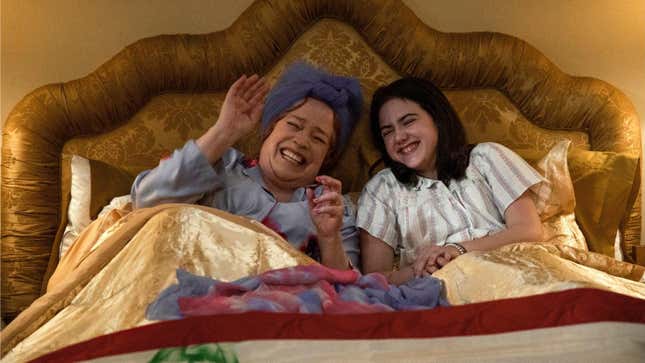‘Are You There God? It’s Me, Margaret’ Takes the Messiness of Girlhood Seriously
Margaret's wonderfully clumsy forays into spiritual reckoning and first bras are underscored by moving performances from Rachel McAdams and Kathy Bates.
EntertainmentMovies

On the pecking order of people in society we take seriously, teenage girls come dead last. Raging with hormones and newly learning how to battle the pressures of the patriarchy, they are perceived as our most unhinged and unreasonable bunch, and so we tend to ignore everything they have to say. The film adaptation of Are You There God? It’s Me, Margaret is the antidote.
From the first moments of the film—wherein Margaret (Abby Ryder Fortson) returns to New York City from summer camp and finds out that she’s moving to New Jersey (the horror!)—it’s evident how seriously the script, like Judy Blume’s beloved 1970 novel, takes pre-teen girlhood. Be it first bras and first periods, or a reckoning with spirituality and faith, every corner of Margaret’s life is examined with sincerity. I was delighted by how this movie deftly bounced from the comedic awkwardness of having a male cashier while trying to buy period pads (not to bleed on, but to practice bleeding on) to the absolute end-of-the-world despair of Margaret and her kooky grandmother, Sylvia (Kathy Bates), realizing that they’ll be seeing a lot less of each other because of the move. Whether silly or actually life-altering, the stakes of every scene are equally high, each of them possessing the power to morph Margaret into the person she’s supposed to be.
Confronted with so many changes (with her body, her surroundings, her social life, and her family) it’s no surprise that when Margaret’s teacher assigns her class a year-long research project, she chooses the subject of religion and starts talking to God. In one after-school scene that finds Margaret working with her classmate Laura (Isol Young)—a girl who’s ironically ostracized for physically developing far earlier than her peers—she slut-shames Laura in a fit of frustration, causing Laura to run out of the library crying. Stunned by her own meanness, Margaret chases after Laura and follows her into a Catholic church, where Laura was planning to give confession. Margaret decides to enter the confession box herself and asks God, “Why do I only feel you when I’m alone?”
-

-

-

-

-

-

-

-

-

-

-

-

-

-

-

-

-

-

-

-

-

-

-

-

-

-

-

-

-

-

-

-

-

-

-

-

-

-

-

-









































